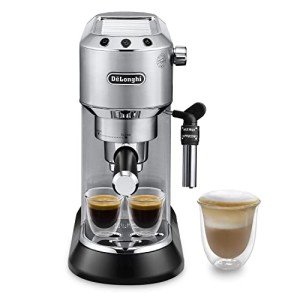Everything You Need To Be Aware Of Home Espresso Machines
The Rise of Home Espresso Machines: A Comprehensive Guide
As coffee enthusiasts continue to seek fresh and delicious brews at home, the appeal of home espresso machines has risen recently. No longer just the domain of cafes and cafe, these machines empower individuals to craft barista-quality espresso drinks from the comfort of their kitchen areas. This post will explore the various kinds of home espresso machines, their features, and considerations for choosing the right one. Furthermore, it will provide a choice of FAQs to assist prospective purchasers make notified choices.
Kinds Of Home Espresso Machines
Home espresso machines can be classified into a number of classifications based upon their systems and user-friendliness. Each type has its unique functions, pros, and cons.
Type
Description
Pros
Cons
Manual Espresso Machines
Needs the user to by hand manage the developing procedure, including techniques like pulling a lever to develop pressure.
- Complete control over brewing process
- Compact design
- Requires ability and practice
- Time-consuming
Semi-Automatic Machines
Machine automates water circulation and pressure, but the user still controls the dosing and duration of the developing process.
- Balance of automation and control
- Versatile
- Learning curve for perfecting methods
Totally Automatic Machines
Automates the entire developing procedure, from grinding to developing, frequently with programmable settings for personalized beverages.
- Extremely user-friendly
- Quick and convenient
- Less control over the developing procedure
- Higher price point
Capsule or Pod Machines
Utilizes pre-packaged espresso capsules or pods to develop coffee quickly and quickly.
- Extremely simple to use
- Minimal cleanup
- Limited taste range
- More pricey per cup than ground coffee
Super-Automatic Machines
Combines functions of completely automatic machines with integrated grinders, allowing users to brew whole bean espresso and milk-based drinks with one touch.
- All-in-one benefit
- Ideal for milk-based beverages
- Often the most pricey
- Can be large
Features to Consider
When choosing a home espresso machine, possible purchasers should consider the following features to ensure they choose a machine that satisfies their requirements:
Grinder Type:
- Built-in mills can offer fresher premises however may require more upkeep.
- Different mills allow for more modification of grind size.
Pressure:
- Look for machines that produce a minimum of nine bars of pressure, which is ideal for brewing espresso.
Water Temperature Control:
- Machines with adjustable temperature settings enable better extraction of taste from beans.
Milk Frothing Options:
- Consider whether you desire a manual steam wand for frothing or an automatic milk frother for benefit.
Reduce of Cleaning:
- Machines with detachable parts and self-cleaning functions significantly lower cleanup time.
Size and Design:
- Ensure the machine fits comfortably in your cooking area and lines up with your aesthetic preferences.
Budget:
- Set a budget before beginning your search, as rates can vary considerably from affordable designs to high-end machines.
Benefits of Home Espresso Machines
Owning a home espresso machine uses numerous benefits:
- Cost-Effective: Over time, brewing espresso in your home can save coffee lovers cash compared to regular coffee shop sees.
- Personalization: Users can try out various beans, grind sizes, and developing strategies to find their ideal cup.
- Convenience: The ability to brew espresso any time removes the need to go out to a coffee shop, particularly useful throughout late nights or early mornings.
- Quality assurance: With a home machine, individuals have complete control over the quality of active ingredients and brewing procedures.
Disadvantages of Home Espresso Machines
Nevertheless, there are some drawbacks to think about:
- Initial Investment: High-quality espresso machines can be expensive, requiring a substantial upfront investment.
- Knowing Curve: Mastering the art of espresso brewing can take some time and practice, which may be daunting for novices.
- Maintenance: Like any device, espresso machines require regular cleansing and maintenance to guarantee optimal efficiency.
Frequently asked questions
1. What is the best kind of home espresso machine for newbies?
Response: For beginners, a semi-automatic machine is typically recommended as it provides a balance between control and automation, allowing you to learn the essentials without frustrating intricacy.
2. How much should I invest in a home espresso machine?
Answer: Entry-level machines can start around ₤ 100 to ₤ 300, while higher-end designs can vary from ₤ 500 to over ₤ 2000. Automatic Espresso Machines to set a budget based upon your anticipated use and preferred features.
3. Do I need a different grinder?
Answer: While some espresso machines feature built-in mills, purchasing a different grinder permits for higher personalization and guarantees better quality premises.
4. How often should I clean my espresso machine?
Answer: Cleaning frequency can vary by machine type, however it's usually suggested to clean up the machine after each use and carry out deep cleansings weekly or month-to-month, depending on usage.
5. Can I make milk-based beverages with any espresso machine?
Response: Not all machines feature milk frothing capabilities. If you enjoy beverages like lattes or cappuccinos, search for a machine with a steam wand or automatic frother.
Home espresso machines are changing the method coffee enthusiasts enjoy their beloved brews. With numerous types and advanced functions available in the market, there is something for everybody. Whether it's the pleasure of producing special recipes or merely relishing the ideal shot of espresso, investing in a home espresso machine can improve both the coffee-drinking experience and the lifestyle for coffee enthusiasts all over. Just like any investment, it is crucial to weigh the advantages versus the potential drawbacks and choose a machine that perfectly fits both your way of life and preferences.
